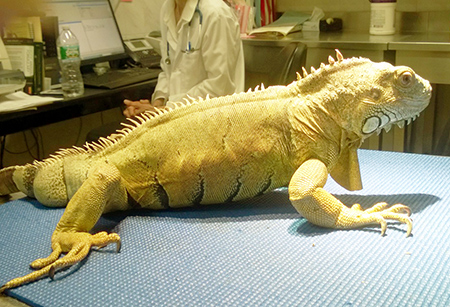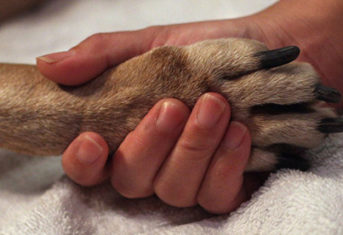Does Menopause Occur in Animals?
Does Menopause Occur in Animals?
 Last week, at the Animal Medical Center, our Avian and Exotic Pet Service examined a geriatric female iguana named Killer. One of her problems was osteoporosis, a disease of the bony skeleton common in post-menopausal women. Given that Killer is an older lady, her family asked a reasonable question, “Is my iguana post-menopausal?”
Last week, at the Animal Medical Center, our Avian and Exotic Pet Service examined a geriatric female iguana named Killer. One of her problems was osteoporosis, a disease of the bony skeleton common in post-menopausal women. Given that Killer is an older lady, her family asked a reasonable question, “Is my iguana post-menopausal?”
A Different Type of Reproductive Cycle
Like female humans, female dogs, cats and farm animals have a reproductive cycle, meaning periods of fertility alternating with periods of reproductive quiescence. In dogs, cats and farm animals this cycle is called the estrus cycle. An estrus cycle is not a menstrual cycle and thus dogs, cats and farm animals cannot have menopause; however, as these species age, fertility clearly wanes.
Reptile Reproduction
Even though some say turtles are ageless, female painted turtles experience a severe drop off in fertility as they age. Female painted turtles over 20 years of age continue to lay large numbers of eggs, but fewer of those eggs hatch, a situation quite different from menopause in women.
Our Closest Relatives
Chimpanzees, our closest relatives, live about 40 years in the wild. A recent study showed female chimps continue to give birth throughout their entire lifespan. A recent study of wild female chimpanzees compared their reproductive senescence to that of humans. The study found that unlike women, the chimps’ reproductive aging paralleled that of their body and chimps do not have an extended post reproductive lifespan analogous to menopause.
Back to Iguanas with Osteoporosis
Killer, the iguana that prompted this discussion, has osteoporosis. In humans, falling estrogen levels resulting from menopause contribute to the development of osteoporosis. In iguanas, the cause of osteoporosis differs. Pet iguanas of any age can develop a nutritional deficiency of calcium leading to osteoporosis, often termed metabolic bone disease in reptiles. Iguanas require a diet with adequate calcium, balanced with an appropriate amount of phosphorus and sunshine which allows them to make vitamin D in their skin. The ultraviolet light from sunshine can also be provided by a special light source. Not equivalent at all to post-menopausal women.
If you have an iguana or another species of captive reptile, be sure you are feeding an appropriate diet and providing adequate ultraviolet light. AMC’s Avian and Exotic Pet Service has developed a list of resources for owners of reptiles which is very informative.

































